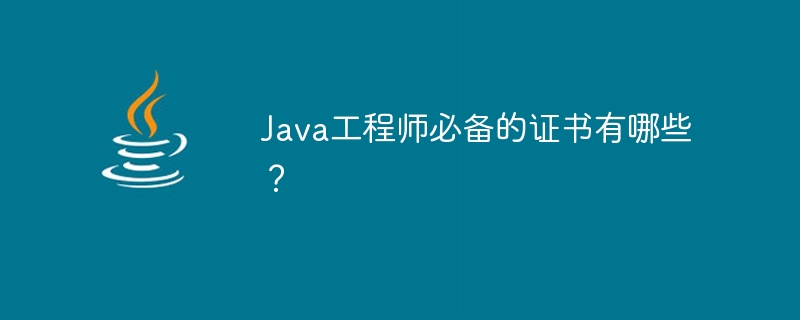Home >Java >javaTutorial >What are the certification certificates commonly used by Java engineers?
What are the certification certificates commonly used by Java engineers?
- PHPzOriginal
- 2024-02-02 21:22:231724browse

Java engineer is one of the most popular technical positions at present. Having professional technical certificates will make him stand out in the workplace. So, what are the necessary certificates for Java engineers? This article will explore the most important certifications for Java engineers.
- SCJP (Sun Certified Java Programmer) certification
SCJP is a basic-level certification for the Java programming language provided by Sun (now acquired by Oracle). This certificate is the first threshold for Java engineers to get started. Passing this certification can prove that students have basic knowledge and abilities of the Java programming language. SCJP certification covers Java basics, object-oriented programming, exception handling, collection framework, input/output streams, multi-threading, etc. Obtaining SCJP certification can not only improve your job search competitiveness, but also deepen your understanding of the Java programming language. - OCPJP (Oracle Certified Professional Java Programmer) certification
OCPJP is an advanced Java programming language certification provided by Oracle. This certification is very important for engineers who already have certain basic knowledge of Java, and can further deepen their understanding and application of the Java programming language. The content of the OCPJP certification examination is relatively more in-depth, including Java data types, operators and expressions, process control, exception handling, collections and generics, multi-threading, input/output streams, serialization, etc. Obtaining OCPJP certification will allow Java engineers to be recognized for their professional abilities and become more competitive. - OCEJWCD (Oracle Certified Expert Java Web Component Developer) certification
OCEJWCD is a professional certification for Java Web component development. Java Web Components are a key technology for Java enterprise-level application development. Mastering this technology is crucial for Java engineers. OCEJWCD certification mainly examines the application of Java Servlet and JavaServer Pages (JSP). Engineers who have obtained OCEJWCD certification can independently develop and maintain Java Web applications and have complete Web development technology. - OCPJBCD (Oracle Certified Professional Java Business Component Developer) certification
OCPJBCD is a certification for Java business component development provided by Oracle. Business component development is one of the key links in Java enterprise-level application development. Mastering this technology can provide reusable and efficient business components and distributed applications. OCPJBCD certification examines technologies such as JavaBeans, EJB (Enterprise JavaBeans) and JDBC (Java Database Connectivity). Obtaining OCPJBCD certification can prove that engineers have advanced Java enterprise-level application development capabilities, which is of great significance for job hunting and career development. - Spring Framework Certification
Spring Framework is one of the most popular Java development frameworks at present. It is very important for Java engineers to master the development and application of Spring Framework. Spring Framework certification examines the core concepts of Spring Framework, dependency injection, AOP (Aspect Oriented Programming) and other contents. Obtaining Spring Framework certification can further enhance engineers' technical capabilities and market competitiveness.
To sum up, for Java engineers, having relevant technical certificates can gain more opportunities and competitiveness in the workplace. SCJP, OCPJP, OCEJWCD, OCPJBCD and Spring Framework certification are one of the most important certificates for Java engineers. Obtaining these certificates can enhance the professional capabilities and career value of engineers. Therefore, for engineers pursuing success in the field of Java, actively pursuing relevant certificates will be a necessary step.
The above is the detailed content of What are the certification certificates commonly used by Java engineers?. For more information, please follow other related articles on the PHP Chinese website!
Related articles
See more- What are the techniques for Vue component development?
- Introduction to the development of custom navigation components for mpvue small and medium-sized programs (code example)
- Vue component practice: data filtering component development
- Vue component practice: development of time selector component
- What does a java engineer do?

